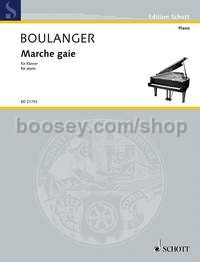Marche gaie - piano
Marche gaie - piano
* Estimated price converted from UK retail price
In her all too brief career, Lili Boulanger (1893-1918) composed a number of works whose existenceis unquestioned for which there is proof they existed but which have now disappeared.One of these missing pieces, Marche gaie, resurfaced in short score form in 2011 in a privatecollection in North Carolina; the owners of the manuscript are the grandchildren of the work’sdedicatee, Jeanne Leygues. As Marche gaie was registered with SACEM (the collecting Society for music in France) as a work for chamberorchestra in 1916, we can assume it was composed in that year. While the manuscript is in anunknown hand, there is musical and circumstantial evidence, combined with testimony fromthe family (whose Leygues ancestors knew the Boulanger family well), that shows beyond reasonabledoubt that this is a missing work by Lili Boulanger.Jeanne Leygues, daughter of the French politician Georges Leygues, briefly Prime Minister in1920-1 and a great supporter of the arts, married an American, Paul Rockwell, who fought withhis brother in the French Foreign Legion in World War I. We can assume that Marche gaie wascommissioned for Jeanne’s wedding in December 1916, not least because the piece alludes toMendelssohn’s famous Wedding March in bars 25-32, a gesture typical of Lili Boulanger, whowas fond of quotation and allusion. Marche gaie was originally paired with a Marche funèbre,a work yet to resurface.It is a pleasure to bring this occasional piece to life. The author is very grateful to Paul Sholarand Vance Brown, of Asheville, North Carolina, for their generous assistance in preparingMarche gaie for publication.- Caroline Potter




